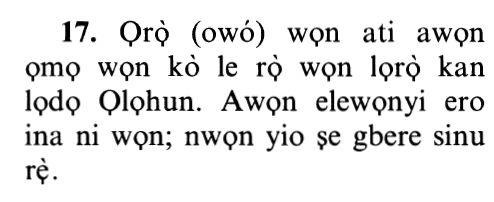58vs17
Select any filter and click on Go! to see results
لَن تُغْنِيَ عَنْهُمْ أَمْوَالُهُمْ وَلَا أَوْلَادُهُم مِّنَ اللَّهِ شَيْئاً أُوْلَئِكَ أَصْحَابُ النَّارِ هُمْ فِيهَا خَالِدُونَ
Lan tughniya AAanhum amwaluhum wala awladuhum mina Allahi shayan olaika ashabu alnnari hum feeha khalidoona
Index Terms
Click to play
Yoruba Translation

Hausa Translation
Dũkiyõyinsu ba su wadãtar musu kõme ba daga Allah, haka kuma ɗiyansu. Waɗannan ´yan wutã ne. Sũ, mãsu dawwama ne a cikinta.
Asbabu n-Nuzuul (Occasions of Revelation)
(Hast thou not seen those who take for friends a folk with whom Allah is wroth?ナ and they will fancy that they have some standing. Lo! is it not they who are the liars?) [58:14-18]. Al-Suddi and Muqatil said: モThis was revealed about Abd Allah ibn Nabtal, the hypocrite who used to keep the company of the Prophet, Allah bless him and give him peace, and then report what he heard from him to the Jews. As the Messenger of Allah, Allah bless him and give him peace, was sitting one day in one of his rooms he said: Now shall enter on you a man who has the heart of a tyrant and who looks through the eyes of the devilメ.
At that point Abd Allah ibn Nabtal who was blue of complexion came in. The Messenger of Allah, Allah bless him and give him peace, said to him: Why do you, and your friends, insult me?メ He swore by Allah that he did not, but the Messenger of Allah, Allah bless him and give him peace, said that he did. The man went and brought his friends who then swore by Allah that they did not insult him. Allah, exalted is He, then revealed these versesヤ.
Muhammad ibn Ibrahim ibn Muhammad ibn Yahya informed us> Muhammad ibn Jafar ibn Matar> Jafar ibn Muhammad al-Firyabi> Abu Jafar al-Nufayli> Zuhayr ibn Muawiyah> Simak ibn Harb> Said ibn Jubayr> Ibn Abbas who related to him that the Messenger of Allah, Allah bless him and give him peace, was sitting under the shade of one of his rooms with a group of Muslims from whom the shade was slowly receding.
He said to them: モA man will come to you and look at you with the eyes of the devil. When he comes do not speak with him!ヤ A man of blue complexion then came. The Messenger of Allah, Allah bless him and give him peace, called him and addressed him: モWhy do you and so-and-so and so-and-so (he named a group of people) insult me?ヤ The man left and brought all those named and they swore by Allah and apologized. Allah, exalted is He, revealed (On the day when Allah will raise them all together, then will they swear unto Him as they (now) swear unto you, and they will fancy that they have some standing. Lo! Is it not they who are the liars?). This was narrated by al-Hakim in his Sahih> al-Asamm> Ibn Affan> Amr al- Anqari> Israメil> Simak.
Allah the Exalted said,
لَن تُغْنِيَ عَنْهُمْ أَمْوَالُهُمْ وَلَا أَوْلَادُهُم مِّنَ اللَّهِ شَيْئًا...
Their children and their wealth will avail them nothing against Allah.
meaning, none of their possessions can avert the affliction when it is sent their way,
... أُوْلَئِكَ أَصْحَابُ النَّارِ هُمْ فِيهَا خَالِدُونَ ﴿١٧﴾
They will be the dwellers of the Fire to dwell therein forever.
قال تعالى " لن تغني عنهم أموالهم ولا أولادهم من الله شيئا " أي لن يدفع ذلك عنهم بأسا إذا جاءهم" أولئك أصحاب النار هم فيها خالدون " .
"لن تغني عنهم أموالهم ولا أولادهم من الله" من عذابه "شيئا" من الإغناء
أي من عذابه شيئا . وقال مقاتل : قال المنافقون إن محمدا يزعم أنه ينصر يوم القيامة , لقد شقينا إذا فوالله لننصرن يوم القيامة بأنفسنا وأولادنا وأموالنا إن كانت قيامة .
I'raab - grammatical analysis of the Qur'an
«لَنْ تُغْنِيَ» مضارع منصوب بلن «عَنْهُمْ» متعلقان بالفعل «أَمْوالُهُمْ» فاعل «وَلا أَوْلادُهُمْ» معطوف على أموالهم «مِنَ اللَّهِ» متعلقان بتغني «شَيْئاً» مفعول مطلق «أُولئِكَ أَصْحابُ» مبتدأ وخبره «النَّارِ» مضاف إليه والجملة استئنافية لا محل لها «هُمْ» مبتدأ «فِيها» متعلقان بخالدون «خالِدُونَ» خبر والجملة استئنافية لا محل لها.
